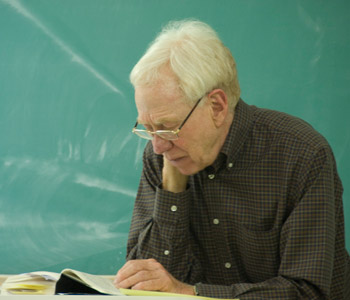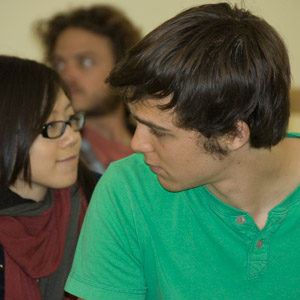For the love of wisdom, philosophy majors grow in number at UC Berkeley
For centuries, great wits and thinkers have poked fun at the paradoxes and practicality of philosophy. Hence the bumper sticker: “Major in Philosophy: It’s by far the Most Interesting Path to Poverty.” But for a growing number of students at UC Berkeley, philosophy is not only a passion, but a smart career move.
May 10, 2011
For centuries, great wits and thinkers have poked fun at the paradoxes and practicality of philosophy. Hence the bumper sticker: “Major in Philosophy: It’s by far the Most Interesting Path to Poverty.”
But for a growing number of students at the University of California, Berkeley, philosophy is not only a passion, but a smart career move. The number of undergraduates majoring in philosophy at UC Berkeley has increased 74 percent in the last decade, from 148 in 2001 to 257 today. Graduates are fanning out into careers ranging from law and business to medicine, technology and pedagogy.
This Sunday, May 15, more than 60 philosophy majors are expected to don caps and gowns for their graduation ceremony in the campus’s Faculty Glade. Among them will be Mi-Hwa Saunders, who is headed to the African archipelago of Cape Verde in July to serve in the Peace Corps.

Hubert Dreyfus and Mi-Hwa Saunders
Like many of her peers in the philosophy department, headquartered at Moses Hall, Saunders raves about the benefits of majoring in philosophy: “We can dissect an argument, be effective communicators, figure out what’s wrong, and take things apart in a way that’s not offensive,” said Saunders, who added that she got “hooked” on philosophy as a junior in high school. “We have a unique skill set that cushions us for whatever we want to do.”
Phoebe Lehr, who graduated from UC Berkeley with a philosophy degree in 2009, contends that the reasoning and argumentative skills she honed have served her well as she pursues a graduate degree as a certified nurse-midwife and women’s health nurse practitioner at the University of California, San Francisco.
“Philosophy has given me the argumentative confidence to assert and defend a point, the humility to accept and modify my beliefs when others have valid arguments against mine, and the stamina to keep arguing,” she said.
Around the nation, philosophy programs at such top-ranked institutions as Rutgers, the University of Notre Dame and the University of Massachusetts, Amherst, also have seen their majors multiply. Educators and students posit that philosophy is an ideal launching pad for graduate school at a time when a bachelor’s degree is no longer enough to compete in the job market.
“For our generation, it’s much harder to do things with just a bachelor’s degree,” said Saunders, who plans to go to law school after she returns from her two-year mission with the Peace Corps. “Having the assumption that you can do anything with a bachelor’s degree is no longer true.”
At UC Berkeley, the philosophy department serves some 2,900 undergraduate and 40 graduate students. With a student-to-faculty ratio of 21 to 1, the department is hard-pressed to keep up with the growing demand for enrollment in its courses, according to philosophy chair Paolo Mancosu, an expert on the philosophy of mathematics and a former Guggenheim fellow.
“We are seeing more and more demand for philosophy courses,” Mancosu said. “Meanwhile, the size of the faculty has remained stable in the last ten years and does not reflect our increased needs.”
“Another surprising fact is that philosophy is among the departments where getting an ‘A’ is still a very difficult feat,” Mancosu added. He cites 2008-2010 data showing that, on average, only 36 percent of students received an ‘A’ in a philosophy class, compared to 34 percent in the mathematical and physical sciences, 47 percent in social sciences, 62 percent in biological sciences and 63 percent in the arts and humanities as a whole, of which philosophy is part.

Hubert Dreyfus checks the text in his Heidegger class
“It’s a very rigorous program,” he said.
Among the department’s more popular courses are “Political Philosophy,” taught this spring by Hans Sluga, a scholar of Nietzsche and Foucault; “Philosophy of Language,” taught by John Searle, a 52-year veteran of the department and faculty pioneer in the campus’s Free Speech Movement; and “Heidegger,” taught by Hubert Dreyfus, whose lectures on the 20th century German existential philosopher have attracted a worldwide following via podcasts and webcasts on iTunes and YouTube.
The Greek word for the “love of wisdom,” philosophy raises questions about existence, knowledge, values, reason, the mind and language. The rigorous training that philosophy majors undergo to grasp epistemology, metaphysics and axiology and to employ critical thinking ranks them among the highest scorers on verbal and analytical tests for admission to graduate school.
In addition to examining the ideas that have shaped the history of civilization, philosophy scholars study evidence, argumentation and how to make ethically sound decisions. Famous former philosophy majors include filmmaker Woody Allen, actor Harrison Ford, billionaire financier George Soros, economist Herbert Simon, conservative pundit Pat Buchanan, NFL quarterback John Elway, novelist Iris Murdoch and civil rights leader Martin Luther King Jr.
Despite the rigors of a philosophical grounding, scholars face everything from awe to wisecracks when they announce their major: “Many of my friends and family were asking, ‘What are you going to do with that degree?’” said Earl Wadsworth, a former Marine and Army Ranger and member of the Cal Veterans group.
Since earning a bachelor’s degree in philosophy from UC Berkeley in 2009, Wadsworth has taught classes at UC Berkeley, including the campus’s Summer Bridge program, and has been consulting at UCSF on the Wounded Warrior Project, which assists war veterans in adjusting to civilian life.
“Philosophy has opened up many doors and has led to incredibly interesting conversations. Quite often, people are like, ‘Wow, tell me more about that,’” said Wadsworth, who will begin graduate studies at the San Francisco Theological Seminary this fall. “It’s the richest academic experience I’ve ever had.”
UC Berkeley junior Hui-Chen Betty Liu became smitten with philosophy when she took a class in junior college at age 15. But family expectations, as well as nagging doubts about the practicality of her avocation, motivated her to double-major in philosophy and economics.

Charles Goldhaber (front) and Hui-Chen Betty Liu in class
“My dad went to medical school, my sister is going to medical school, my brother is studying electrical engineering,” she said. “I worry about what a philosophy degree means.”
That said, Liu has resolved her academic quandary: “I major in philosophy for the training, thinking rigorously, questioning the basic assumptions of whatever is being discussed, perfecting the economy of words,” she said. “I wouldn’t want to leave Berkeley without philosophy training.”
Liu is among a number of students who were drawn to philosophy after taking a class from Dreyfus, 81, an Indiana-born, Harvard-educated philosopher who recently coauthored the book “All Things Shining: Reading the Western Classics to find Meaning in a Secular Age” with Harvard philosophy chair Sean Dorrance Kelly.
In turn, Dreyfus attributes his popularity to Martin Heidegger, author of the 1927 book, “Being and Time,” who argued that Plato, Aristotle, Descartes, Kant and other great Western thinkers focused too much on the permanent rather than on the fleetingness of life.
“I must be channeling Heidegger,” Dreyfus quipped.
Daniel Sharp, a junior majoring in philosophy, arrived at UC Berkeley in 2008 with half a mind to pursue interdisciplinary studies — until a friend convinced him to take a class from Dreyfus.
“I very quickly figured out that that was what I wanted to major in,” Sharp said. “It captured my interest. It was saying something about human beings, about myself.”
Now he’s hooked. “I don’t know how to stop doing it. It’s almost like an addiction,” said Sharp, who hopes one day to teach philosophy.
Another fan of Dreyfus is Charles Goldhaber, a senior majoring in philosophy and Japanese. He will tell his story as the undergraduate student speaker at this Sunday’s philosophy department graduation ceremony.
When Goldhaber first got to UC Berkeley in 2007, he toyed with majoring in English. But after his father, a UC Berkeley alumnus, recommended he take a class with Dreyfus, there was no turning back.
“I certainly enjoyed that class a lot – so much so that, by the end of the semester, I decided to major in philosophy,” Goldhaber said. “He shines as a fantastic human. You can really tell he loves teaching.”
Of his own attraction to philosophy, Goldhaber says, “It’s about understanding how to look at things. It’s about answering the questions that we naturally are curious about – the really hard ones like: What do I do? How do we get along? I can hardly picture myself doing anything else.”